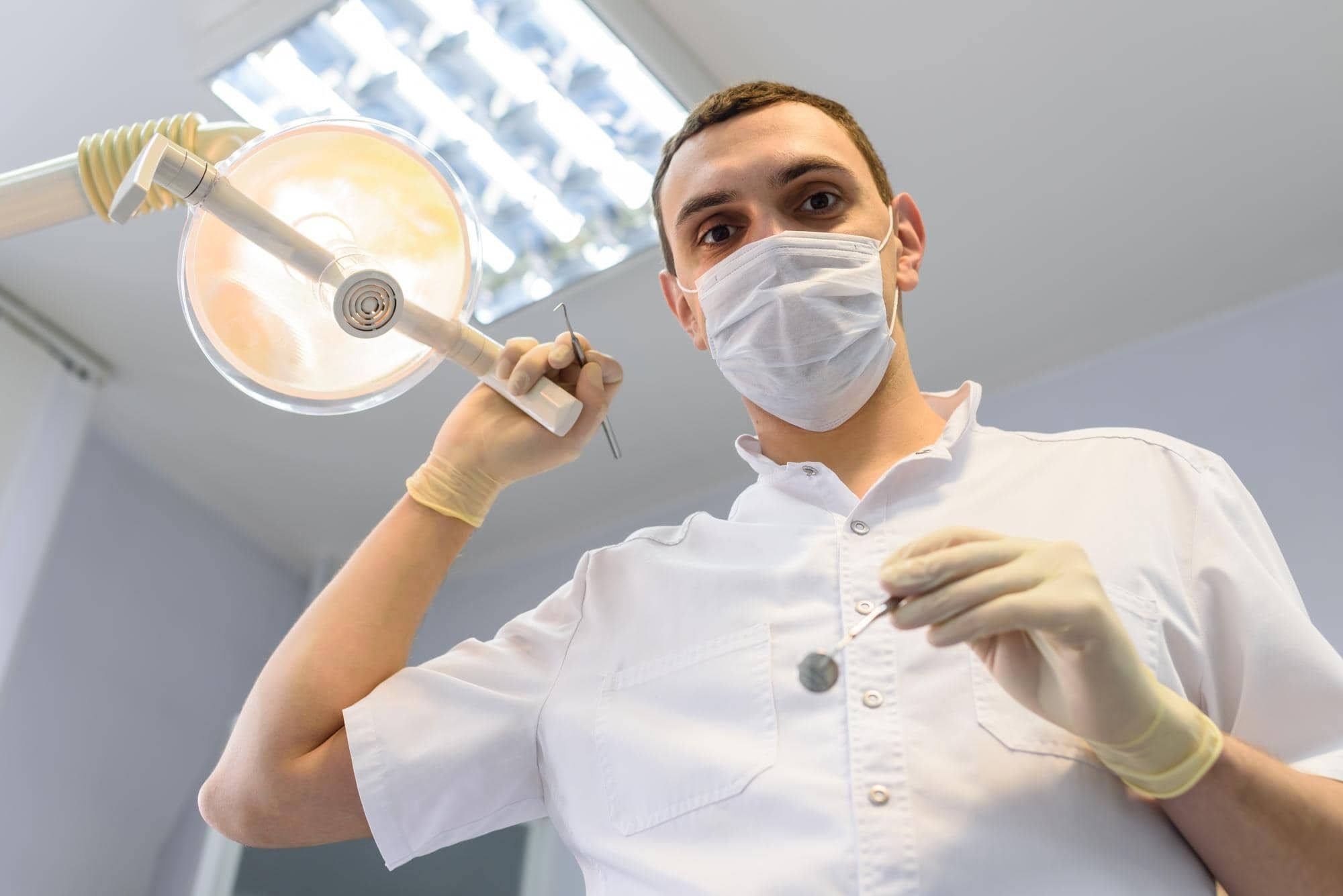Oral surgery is a subspecialty of dentistry concerned with fixing problems of the mouth, jaw, and teeth. Finding the appropriate oral surgeon is essential for getting the greatest results from any kind of dental surgery, be it a tooth extraction, dental implant, or corrective jaw surgery.
But how can you decide which dental surgeon to visit when there are so many to select from? To help you choose the best surgeon, we’ve compiled a list of five key questions to ask during the interview process. Read more to find out!
What is a Maxillofacial Surgeon?
Oral and maxillofacial surgeons, often referred to as maxillofacial surgeons possess specialized training to address an extensive array of conditions and traumas affecting the head, neck, mouth, jaw, and facial regions. Their expertise encompasses the treatment of various issues such as misaligned jaws, impacted wisdom teeth, oral reconstructive surgeries, head and neck cancers, and dental implants.

What Should I Look for in an Oral Surgeon?
If you want your teeth surgery to go well, picking the appropriate surgeon is crucial.
Consider these factors while you search for a dental surgeon:
- Make sure your dental specialist has the right credentials and training. To get the best results, it’s important to find a surgeon who has gone above and beyond to become board-certified. Oral and maxillofacial surgery residency is required.
- Choose a surgeon who has prior expertise with your desired surgery. Inquire as to the frequency with which the procedure has been carried out and the proportion of successful outcomes.
- Ensure that the clinic is outfitted with state-of-the-art technology and surgical tools. This can provide a more pleasant experience and a more productive procedure overall.
- Seek a surgeon who is a strong communicator and will spend the time with you to answer your concerns and address your worries. Before and after surgery, they should give you thorough instructions and thoroughly describe the operation.
- Get referrals from your dentist or other trusted sources. You may learn a lot about the quality of care you can expect from a surgeon by reading patient reviews and testimonials posted online.
- Selecting a competent oral surgeon is crucial to the outcome of your treatment. Choose a dental surgeon with the right combination of training, expertise, and cutting-edge equipment.
What Do I Need to Know After Oral Surgery?
If you’ve recently had teeth surgery, you should take good care of yourself and carefully adhere to your surgeon’s post-operative recommendations to ensure a quick recovery and avoid any undesired problems after the treatments such as Dental Veneers and Dental Braces.
After dental treatment, it’s crucial that you maintain the following general dentistry tips:
Resting: You should get as much rest as you can after surgery to help your body heal. After surgery, rest for at least 24 hours before engaging in any vigorous activities.
Pain Management: Having some soreness and discomfort following surgery is to be expected. The pain medication your surgeon prescribes will help alleviate the discomfort you’re experiencing. Always read and follow the label recommendations for proper dosage and never take more than what is suggested.
Swelling: Using cold packs for a period of 20 minutes with a 20-minute pause can reduce swelling following surgery. Maintain contact with your surgeon if the swelling does not subside.
Balanced Diet: For several days following surgery, a soft food diet is recommended. Foods that are crunchy, spicy, or acidic should be avoided since they may cause irritation to the surgical incision.
Dental Hygiene: It’s essential to maintain dental hygiene after dental surgery, but for the first few days, you shouldn’t brush or floss the area where the surgery was done. Instead of using regular mouthwash, your surgeon may prescribe an antibacterial mouth rinse.
Follow-up Appointments: Your doctor will set up a follow-up consultation to check on how well you are healing and, if necessary, take out any stitches. You must keep these visits for optimal recovery.
If you take good care of yourself after oral surgery and follow your surgeon’s post-operative recommendations, you should have a quick and complete recovery.
Questions To Ask The Oral Surgeon
When searching for a surgeon, it is important to ask the following five questions:
1. What Is Your Level of Experience and Training in Oral Surgery?
Finding a dental specialist who has the appropriate academic background to carry out the procedure is crucial. Please inquire about the surgeon’s training and experience, as well as their status as a board-certified specialist in surgery procedures.
You might inquire about their success rate and the number of times they have performed the surgery you need whether it is Zirconium Veneers or Laminate Veneers. You have a better chance of having a good experience and good outcomes if you go to a surgeon who has a lot of expertise and a history of good outcomes.
If you want safe and successful treatment, you need a surgeon with the right education, training, and expertise.
2. What Types of Oral Surgery Procedures Do You Specialize in?
Asking a possible dental surgeon what operations they focus on most is a key step in making a final decision. Depending on their training and interests, they may specialize in a variety of various procedures.
A dental specialist might choose to focus on one or more of the following general dentistry areas of dental surgery:
- Dental Implants
- Zirconium Veneer
- Laminate Veneer
- Porcelain Crown
- Orthodontics
- Teeth Whitening
- Smile Design
You can learn more about the surgeon’s experience and skill with your desired operation by inquiring about their specialty areas. This can provide you peace of mind and guarantee that you get the best treatment available for your specific needs.
3. What Is Your Approach to Pain Management During and After Surgery?
The dental surgeon should be consulted both prior to and following the dental treatment to discuss pain treatment options.
You can learn about the surgeon’s pain treatment technique by asking the following questions:
- Do you use general anesthetic or local?
- When this treatment is being done, will I be conscious or asleep?
- Is there going to be any discomfort during the procedure?
- What postoperative pain relief solutions are there?
- How long will I be in discomfort following surgery?
Depending on the nature of your dental treatment such as Dental Implants or Whitening Teeth, your surgeon may use a mix of local anesthetic, sedation, and general anesthesia. After surgery, they should talk about different ways to deal with pain, such as with prescription drugs, painkillers, and complementary treatments like cold packs.
If you have any questions or concerns about pain control, be sure to ask your surgeon before surgery. Together, you can develop a specialized pain control plan that works for you. Use any prescribed pain relievers and healing supplements as advised after surgery to ensure the best possible recovery.
4. How Do You Handle Complications That May Arise During Surgery?
Complications can arise during teeth surgery, even in the hands of the most qualified surgeons. Be sure to inquire about your dental surgeon‘s training and strategy for dealing with potential problems before undergoing surgery.
You can learn more about your surgeon’s strategy for dealing with problems by asking the following questions:
- In your experience, what are the most typical problems that can arise during the operation?
- How do you keep an eye out for and handle any problems that may arise throughout the operation?
- Just how do you keep in touch with the patient and their relatives when they’re under anesthesia?
- Can you describe your plan for dealing with potential postoperative problems?
If your surgeon anticipates any problems during your surgery, including heavy bleeding, loss of feeling, or infection, you can feel more at ease. Your dental specialist must have a strategy in place to treat any complications that may arise, keeping you safe and comfortable at all times.

5. Can You Provide References or Reviews From Previous Patients?
The best way to choose a surgeon is to get recommendations from people who have used their services. This might give you an indication of the surgeon’s clinical skills and communication skills in addition to their expertise and skill level.
These are some inquiries regarding patient testimonials:
- Do you have any feedback from satisfied clients?
- Do you have internet testimonials I may read about your service?
- May I request some examples of your work, such as before and after pictures or case studies?
You can learn more about the surgeon’s reputation and how satisfied their patients are by reading reviews and testimonials if any have been collected. Learn more about the surgeon’s past works and what to expect from them. This can provide you peace of mind about the surgeon you choose and ensure that you get the best treatment possible.
How to Choose the Right Surgeon?
Getting the services of a dental specialist who has expertise in your particular surgery is essential. Here at the IsDentBul clinic, we are proud to offer our patients only the most advanced oral surgical techniques as can be seen from our clinic’s gallery. From simple tooth extractions to complex corrective jaw surgeries, our skilled team puts the comfort and safety of each patient first.
To help you feel comfortable with your decision to see a dental surgeon, we are delighted to supply you with feedback from our prior patients as well as references. Get in touch with us right away to set up a consultation and find out more about our individualized approach to dental surgery.
Oral Surgery-Maxillofacial Surgeon Turkey
Oral and maxillofacial surgeons in Turkey are highly skilled medical experts who treat complex oral and face disorders. These surgeons are well-known for their experience in dealing with a wide range of mouth, jaw, and face ailments. They have had considerable training and use modern surgical techniques. In Turkey, oral surgeons provide complete care, which includes dental implants, corrective jaw surgery, face trauma repair, and therapy for oral disorders.
Oral Surgery with Isdentbul
With Isdentbul as your trusted partner in oral surgery, you may embark on a streamlined route to oral health excellence. At Istanbul, we value your health and provide a variety of innovative oral surgery treatments adapted to your specific requirements. Whether you need wisdom teeth removed or dental implants, our skilled staff is committed to providing customized, compassionate treatment. Contact us now to set up a consultation and learn how Isdentbul can improve your dental health with skilled oral surgery. We are the first stop on your path to a healthier, more brilliant smile.
FAQ’s
What is the difference between oral and dental surgeons?
Oral surgeons, sometimes known as oral and maxillofacial surgeons, receive an additional four to six years of education than regular dentists. They do residencies in hospitals and specialize in treating problems with the soft and hard tissues of the mouth, jaw, and face.
What is the proper name for an oral surgeon?
An oral surgery specialist is properly referred to as an Oral and Maxillofacial Surgeon.
Is a periodontist better than an oral surgeon?
Oral surgeons focus primarily on the surgical aspects of dental care, whereas periodontists undergo advanced training in implant dentistry and specialize in enhancing oral health through less invasive techniques, often avoiding extensive surgical interventions. The choice between the two depends on your specific needs and preferences.
Can an oral surgeon fill a cavity?
It varies. While some individuals may believe that dentists and oral surgeons perform identical roles, the reality differs. Dentists focus on overall oral health care and treatments, encompassing procedures such as tooth extraction, cleaning, surgeries, bone grafting, and cavity filling, among others.
What are the qualities of an oral and maxillofacial surgeon?
Oral surgeons must have numerous crucial characteristics. These include expertise and experience in a variety of dental procedures, excellent communication skills for effective patient interaction, compassion and empathy for support and comfort during treatments, attention to detail for precise procedure execution, and a commitment to continuous learning and improvement to stay current with the latest advancements in dental care.








